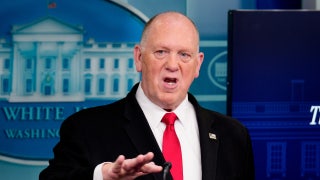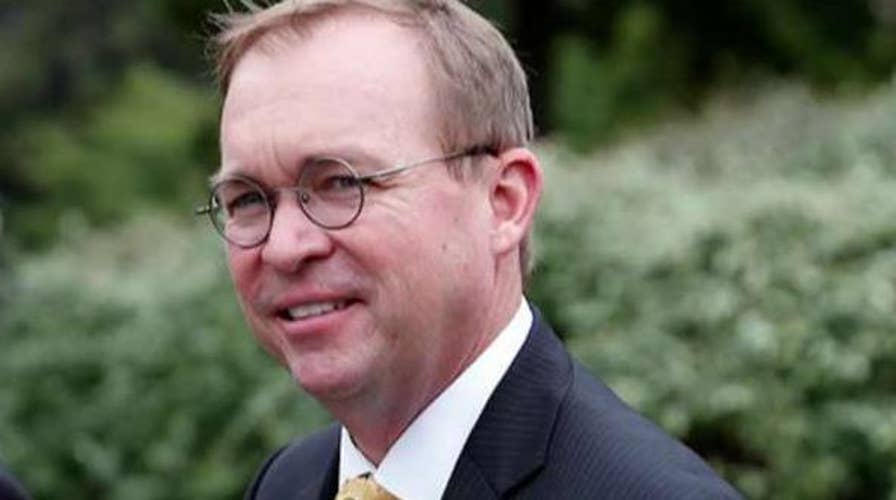Does Mick Mulvaney make a government shutdown more likely?
Democratic campaign consultant Doug Schoen and GOP Strategist David Avella weigh in on President Trump’s chief of staff pick, Mick Mulveny.
Outgoing White House Chief of Staff John Kelly was the right person for the job in the first half of President Trump’s current term. Budget Director Mick Mulvaney is the right person to take on the job of acting White House chief of staff in the new year.
Both men are enormously talented and dedicated public servants, but they bring different skill sets and experiences to the job of chief of staff – a job that will have new demands in the next two years.
Much will be different in the second two years of President Trump’s current term than in the first two. And when circumstances change, the tasks to be accomplished and the skills needed to accomplish those tasks change as well – frequently leading to personnel changes in just about every White House after midterm elections.
It’s as if a great football team was suddenly told it had to play baseball. Different players would be recruited for the different game. The star quarterback wouldn’t become the star pitcher.
The only constant in any White House is change. In fact, the average tenure of a senior White House official is 18 to 24 months. Working for the president of the United States in the West Wing is an opportunity – not a career. You serve at the pleasure of the president and then you go. The key is to not overstay your welcome.
In President Trump’s first two years in office, Republicans controlled both the House of Representatives and the Senate. But Democrats will become the majority party in the House for the next two years – and you can bet that they’ll be launching investigations galore and seeking at every turn to block the president’s legislative agenda.
On top of this, Special Counsel Robert Mueller’s investigation of allegations of collusion between Russia and the Trump presidential campaign – allegations the president vehemently denies – should be coming to a close sometime in the next two years, creating new challenges for the president and his White House staff. And the president will be gearing up and then waging his 2020 re-election campaign.
Kelly – who spent more than 40 years in the Marines and retired as a four-star general – has done a great job for President Trump and brought stability to the West Wing with his sure and steady hand. But he was a bit handicapped by the fact that he did not come from a political background – and this would pose a greater challenge in the two years ahead.
The next phase of the Trump presidency will be a balance between an agenda of governing, politics, international challenges and ongoing Democratic resistance and investigations. It will be Mick Mulvaney’s job to manage all competing interests.
In contrast, Mulvaney has extensive political experience. He served for four years in the South Carolina legislature, and then six years in the U.S. House representing his state as a Republican before becoming Director of the Office of Management and Budget in February 2017. This experience makes him ideally suited to help the president deal with a Democratic House and the Republican Senate, and prepare for the 2020 election.
A chief of staff to a president is a combination of a lot of things: You are a gatekeeper – controlling access to the president. You are a referee – managing a staff with competing interests and opinions. You care for the president – making sure he has a balance to his schedule and manages his public and private life.
You are a policy driver – making sure the president’s agenda is kept on track. You are a manager of a diverse staff. You are a liaison to other Cabinet members.
You are a negotiator who has to frequently reach out to Congress and others to press the president’s points. You are a point of contact for foreign governments – working with other nations to keep a balance between a domestic and foreign policy agenda. You are a politician who must balance an official schedule with a political one.
A chief of staff is the first person the president sees in the morning and the last person he sees when he leaves at night. The chief is on duty 24/7. Few people get to see the president without his knowledge and permission.
There are typically only a handful of people who typically have “walk-in” privileges that allow them access to the president as needed. A chief must balance wants and needs. Chief of Staff Andy Card, who worked for President George W. Bush, had a rule: if you want to see the president you never will; but if you need to see the president you always will.
To be an effective chief of staff to the president you must devote yourself to him. In addition, you must have the complete trust and confidence of the president and the first lady.
The best chiefs of staff are the ones who can work well with the East Wing of the White House (where the first lady and her staff work) as well as with the West Wing, where the president and his staff work.
It is very difficult to balance a private life with your service to a president. Because the job is so demanding it is not unusual for chiefs to come and go.
I am sure White House staffers are now being asked about their plans for the next two years. Do they plan to stay or go? I am sure some will be asked to go because they have overstayed their welcome.
Now is the time to build a staff geared toward President Trump’s re-election. Some staffers will leave the White House and will go to the campaign.
The next phase of the Trump presidency will be a balance between an agenda of governing, politics, international challenges and ongoing Democratic resistance and investigations. It will be Mick Mulvaney’s job to manage all competing interests. He must make sure the Trump train is not derailed.
Mulvaney will need the patience of a saint, the managerial skills of a CEO, the political acumen of a party chairman, the skills of a diplomat and a skin as thick as an elephant’s hide in his new job. It’s a tough job, but President Trump has picked a talented man with a great record and great promise to take it on.









































